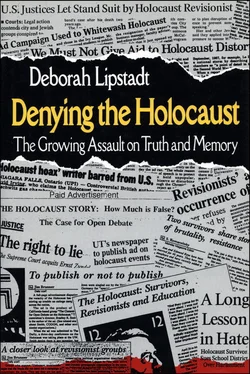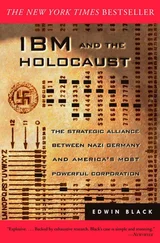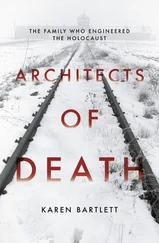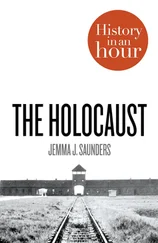For some deniers Hitler was a man of peace, pushed into war by the aggressive Allies. {79} According to them, the Germans suffered the bombing of Dresden, wartime starvation, invasions, postwar population transfers from areas of Germany incorporated into post-war Poland, victors’ vengeance at Nuremberg, and brutal mistreatment by Soviet and Allied occupiers. Portrayed as a criminal nation that had committed outrageous atrocities, Germany became and remains a victim of the world’s emotional and scholarly aggression.
But it is showing the Holocaust to have been a myth that is the deniers’ real agenda. They contend that the ultimate injustice is the false accusation that Germans committed the most henious crime in human history. The postwar venom toward Germany has been so extreme that Germans have found it impossible to defend themselves. Consequently, rather than fight this ignominious accusation, they decided to acknowledge their complicity. This seeming contradiction—namely that the perpetrators admit they committed a crime while those who were not present exonerate them—presents a potential problem for the deniers. How can a group that did not witness what happened claim that the perpetrators are innocent while the perpetrators acknowledge their guilt? The deniers explain this problem away by arguing that in the aftermath of World War II the Germans faced a strategic conflict. In order to be readmitted to the “family of nations,” they had to confess their wrongdoing, even though they knew that these charges were false. They were in the same situation as a defendant who has been falsely convicted of committing horrendous crimes. He knows he will be more likely to receive a lenient sentence if he admits his guilt, shows contrition, and makes amends. So too the innocent Germans admitted their guilt and made (and continue to make) financial amends.
The defendants at the war crimes trials adopted a similar strategy. They admitted that the Holocaust happened but tried to vindicate themselves by claiming they were not personally guilty. Arthur Butz, a professor of electrical engineering at Northwestern University, is the denier who has most fully developed this theory of what I call incrimination to avoid self-incrimination. (For a fuller treatment of this see chapter 7.)
Deniers acknowledge that some Jews were incarcerated in places such as Auschwitz, but, they maintain, as they did at the trial of a Holocaust denier in Canada, it was equipped with “all the luxuries of a country club,” including a swimming pool, dance hall, and recreational facilities. {80} Some Jews may have died, they said, but this was the natural consequence of wartime deprivations. [6]
The central assertion for the deniers is that Jews are not victims but victimizers. They “stole” billions in reparations, destroyed Germany’s good name by spreading the “myth” of the Holocaust, and won international sympathy because of what they claimed had been done to them. In the paramount miscarriage of injustice, they used the world’s sympathy to “displace” another people so that the state of Israel could be established. {81} This contention relating to the establishment of Israel is a linchpin of their argument. It constitutes a motive for the creation of the Holocaust “legend” by the Jews. Once the deniers add this to the equation, the essential elements of their argument are in place.
Some have a distinct political objective: If there was no Holocaust, what is so wrong with national socialism? It is the Holocaust that gives fascism a bad name. Extremist groups know that every time they extol the virtues of national socialism they must contend with the question: If it was so benign, how was the Holocaust possible? Before fascism can be resurrected, this blot must be removed. At first they attempted to justify it; now they deny it. This is the means by which those who still advocate the principles of fascism attempt to reintroduce it as a viable political system (see chapter 6). For many falsifiers this, not antisemitism, is their primary agenda. It is certainly a central theme for the European deniers on the emerging far right.
When one first encounters them it is easy to wonder who could or would take them seriously. Given the preponderance of evidence from victims, bystanders, and perpetrators, and given the fact that the deniers’ arguments lie so far beyond the pale of scholarly argument, it appears to be ludicrous to devote much, if any, mental energy to them. They are a group motivated by a strange conglomeration of conspiracy theories, delusions, and neo-Nazi tendencies. The natural inclination of many rational people, including historians and social scientists, is to dismiss them as an irrelevant fringe group. Some have equated them with the flat-earth theorists, worthy at best of bemused attention but not of serious analysis or concern. They regard Holocaust denial as quirky and malicious but do not believe it poses a clear and present danger.
There are a number of compelling reasons not to dismiss the deniers and their beliefs so lightly. First, their methodology has changed in the past decade. Initially Holocaust denial was an enterprise engaged in by a small group of political extremists. Their arguments tended to appear in poorly printed pamphlets and in right-wing newspapers such as the Spotlight, Thunderbolt, or the Ku Klux Klan’s Crusader. In recent years, however, their productivity has increased, their style has changed, and, consequently, their impact has been enhanced. They disguise their political and ideological agendas. {82} Their subterfuge enhances the danger they pose. Their publications, including the Journal of Historical Review —the leading denial journal—mimic legitimate scholarly works, generating confusion among those who (like the Yale history student) do not immediately recognize the Journal ’s intention. Their books and journals have been given an academic format, and they have worked hard to find ways to insinuate themselves into the arena of historical deliberation. One of the primary loci of their activities is the college campus, where they have tried to stimulate a debate on the existence of the Holocaust. It is here that they may find their most fertile field, as is evident from the success they have had in placing advertisements that deny the Holocaust in college newspapers (see chapter 10). They have also begun to make active use of computer bulletin boards, where they post their familiar arguments. Certain computer networks have been flooded with their materials. Their objective is to plant seeds of doubt that will bear fruit in coming years, when there are no more survivors or eyewitnesses alive to attest to the truth.
There is an obvious danger in assuming that because Holocaust denial is so outlandish it can be ignored. The deniers’ worldview is no more bizarre than that enshrined in the Protocols of the Elders of Zion, a report purporting to be the text of a secret plan to establish Jewish world supremacy. {83} The deniers draw inspiration from the Protocols, which has enjoyed a sustained and vibrant life despite the fact it has long been proved a forgery.
Many years ago the prominent German historian Theodor Mommsen warned that it would be a mistake to believe that reason alone was enough to keep people from believing such falsehoods. If this were the case, he said, then racism, antisemitism, and other forms of prejudice would find no home. To expect rational dialogue to constitute the sole barriers against the attempts to deny the Nazi annihilation of European Jewry would be to ignore one of the ultimate lessons of the event itself: Reasoned dialogue has a limited ability to withstand an assault by the mythic power of falsehood, especially when that falsehood is rooted in an age-old social and cultural phenomenon. There was no rational basis to the Nazi atrocities. There was, however, the mythic appeal of antisemitism. Hitler and the Nazis understood this. Mythical thinking and the force of the irrational have a strange and compelling allure for the educated and uneducated alike. Intellectuals in Nazi Germany were not immune from irrational, mystical thinking. So, too, among the deniers.
Читать дальше












